HOME | ABOUT US | MEDIA KIT | CONTACT US | INQUIRE
HOME | ABOUT US | MEDIA KIT | CONTACT US | INQUIRE
The dictionary definition of “melee” reads thusly: “A struggle. Especially: a hand-to-hand fight among several people.”
That’s about as close as we’ll come to describing the process that produced this half-century take on the most influential business figures in Kansas City.
Right up front, let’s agree: There will be no agreement. If you asked nearly 70,000 monthly readers to produce such a list, you’d probably get nearly 70,000 lists of varying degree. It’s never a pleasant conversation when a group of editors must to some extent subjectively assess relative levels of influence in collection of talent this big, even when some objective measures are available.
For starters, the candidate pool was more than 250 deep. That’s a standard Pareto distribution: 20 percent of those being considered will make it, and 80 percent won’t. We don’t do this to hurt the feelings of anyone not included here. But we do see a value in helping our readership—especially those who haven’t been part of the regional business scene for most of those years—understand how this city’s business ecosystem developed, and who played the biggest parts in that.
And, yes, we know: Any examination going back to an American era that no longer exists will, by definition, produce a field of honorees that doesn’t look like the Kansas City business class today. Again, not to twist anyone off, but we think the contributions of those who paved the way for a region’s success are worth remembering. We’re well aware of equity and inclusion and when deliberating over the selection of this group, folks will notice the absence in equity including color and gender. We’re reporting it as we see it based purely on contributions from the absolute most productive and achieved over the course of the last half a century.
It’s largely a different list from the 20 Ingram’s Legends you will see beginning on page 19 of this issue; that’s because the latter feature is devoted to the folks who—still living—are approaching the end of their careers, if not already retired. Ingram’s editors name Legends every five years. This group of stars are, in our eyes, the brightest over the past half a century. We hope you’ll agree.
Please enjoy what our editors will agree may be the most challenging selection process of the three decade our team has published Ingram’s. Enjoy!
 Bert Berkley, Tension Corp.
Bert Berkley, Tension Corp.
This longtime, third-generation head of what was formerly Tension Envelope helped set it on the path to innovation that would give the family business the international footprint it enjoys today. But while he was doing that—and raising a family with his beloved Joan—Bert Berkley was the very face of a Good Corporate Cit-izen. That meant stints in leadership roles for the Civic Council. And the Chamber of Commerce. It meant service on the parks and library boards. It meant engagement with the Kauffman Foundation to promote entrepreneurship, and with the United Way to bolster corporate philanthropy. Then, as retirement-age beckoned, he worked to found the Local Investment Commission, a non-profit focused on filling gaps in the social safety net for children and families. Educated at Duke University and Harvard Business School, this veteran of World War II and Korea turns a remarkable 101 years old this month.
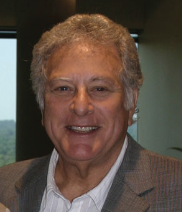 Bob Bernstein, Bernstein Rein
Bob Bernstein, Bernstein Rein
By now, most anyone in media circles knows the Happy Meal story authored by the man who created the concept for McDonald’s. But there’s so much more to Bob Bernstein’s ad-agency and entrepreneurial success than boating that whale back in the late ’70s. The Kansas City agency he co-founded (with just $100 in the bank) along with Chip Rein would go on to land monster accounts with the likes of Walmart and Blockbuster (yes, movies used to be rented on tape and DVD) on its way to becoming the sixth-largest independent ad agency in the country. Not constrained by the silo walls of advertising, Bernstein founded the retailer Beauty Brands before selling it to a private-equity firm in 2013 (later to be re-acquired by the Bernstein family). And his philanthropic side was recognized when Jewish Family Services introduced the annual Phyllis and Bob Bernstein Humanitarian Award.
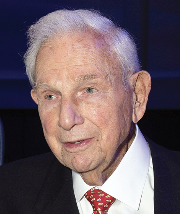 Henry Bloch, H&R Block
Henry Bloch, H&R Block
He served as a B-17 navigator during World War II, so Henry Bloch knew what real fear felt like. Going into business wasn’t even close to it. For nearly a decade after his return from Europe, he and his younger brother, Richard, operated a walk-up accounting practice in Kansas City’s Midtown. As a courtesy to clients, they’d prepare tax returns at no extra charge. The word got out, the demand came in torrents, and the realization hit: Tax prep, not accounting and bookkeeping, was the path. In July 1955, they founded H&R Block, took it public in 1962, and never looked back. Bloch’s work helped establish not only a global financial-services giant, but set a standard for philanthropy—corporate and personal—matched by few in Kansas City. And he was legendary for his willingness to counsel young entrepreneurs who wished to do the same. He died in 2019, a few months shy of his 97th birthday.
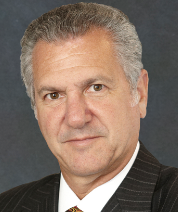 Ken Block, Block Real Estate Services
Ken Block, Block Real Estate Services
Raised in the shadow of one iconic name in commercial real estate, Ken Block is blotting out a fair amount of sun on his own. Along with brothers Stephen and Michael, he formed Block Real Estate Services in 2009 after long careers with the brokerage firm their father, Allen, started with his own brother in 1946. Under Ken’s leadership, the second generation broadened its horizons—rapidly. Stepping into new territory with multifamily properties, buying and developing them, then expanding into real-estate investment services, property management, and even consultancy on economic incentives, BRES has evolved into a national player in commercial realty; over the years, the firm’s principals have done deals in 245 cities covering 45 states. All told, it manages more than 45 million square feet of office, retail and industrial properties.
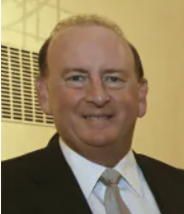 Larry Bridges, Executive Hills Management
Larry Bridges, Executive Hills Management
For more than 40 years under the steady hand and savvy lead of Larry Bridges, Executive Hills Management has owned and managed some of the most prominent office buildings in the Kansas City area. And when we say prominent, we mean it: A crown jewel in its holdings here is One Kansas City Place, the tallest building in Missouri. Combined, those properties make EH the single largest owner-operator of commercial office space in this region, with roughly 4 million square feet of Class A office space and related parking structures. In addition to the 800,000 square feet at One Kansas City Place, it has The Plaza Steppes building on the Country Club Plaza, an additional 1 million-plus square feet along the Ward Parkway corridor, and more than 1 million more square feet in South Kansas City. On the Kansas side, it owns or manages 10 office buildings that line Overland Park’s College Boulevard corridor.
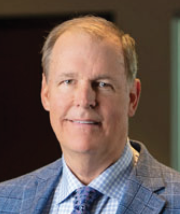 Michael Brown, Euronet Worldwide
Michael Brown, Euronet Worldwide
Nearly two decades after Michael Brown earned an electrical-engineering degree from Mizzou, he was knocking out a master’s degree in molecular and cellular biology at UMKC, at a time when most men of the age are still grappling with a midlife crisis. This serial entrepreneur wasn’t having any of that. The ink was still wet on his bachelor’s when, in 1979, he saw an opportunity to integrate business software for a recent addition to the consumer market: personal computers. He formed Innovative Software, turned it into the region’s fastest-growing company in 1986, then merged that into an advanced database software firm called Informix, and more than doubled revenues in just two years. He co-founded Euronet Worldwide in 1994 and has served as its chief executive officer ever since, delivering cash through ATMs and other services in more than 60 nations around the world, from more than 53,000 ATMs.
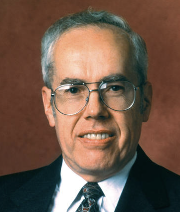 Gary Burrell, Garmin
Gary Burrell, Garmin
True innovation—and the billion-dollar companies it can create—is still pretty rare, but Gary Burrell cracked the code in 1989 when he and Min Kao teamed up to give consumers access to wayfinding signals from space through the Global Positioning System. That sent Garmin on a journey of growth and challenge. After becoming a dominant player in GPS systems for cars, boats and planes, Garmin ran into headwinds with the launch of smart-phone programs that could deliver directional assistance at no cost. Burrell retired in 2002 as the company was pivoting to wearable tech, a concept that has evolved into a suite of personal health-monitoring and improvement products. And once again, Garmin is a global leader in that tech field. The company that started with two men now employs more than 5,000 people at the Olathe headquarters, and 19,000 in 35 countries worldwide.
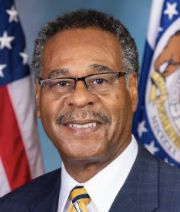 Emanuel Cleaver, City of KCMO / U.S. House
Emanuel Cleaver, City of KCMO / U.S. House
After 12 years on the Kansas City Council, Emanuel Cleaver stepped onto the final rung of municipal leadership, becoming the city’s first black mayor in 1991. He brought to that role an intentional focus on development as an economic leveler—pushing not just to create the kinds of jobs needed to break the cycle of poverty but bringing those employers into the neighborhoods closer to its source. He was also instrumental in pressing for completion of a project that had languished for decades but had the potential to connect poorer sections of southern Kansas City to job centers near Downtown: What we now know as Bruce R. Watkins Drive. He also advocated for greater city funding of the 18th and Vine entertainment district. This ordained minister continued his commitment to public service by running for Congress in 2004 and has easily won reelection to the U.S. House eight times. He’s currently seeking a 10th term representing Missouri’s Fifth District.
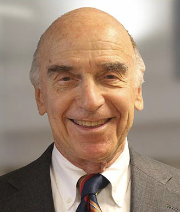 Paul Copaken, Copaken White & Blitt
Paul Copaken, Copaken White & Blitt
A list of Paul Copaken’s commercial real-estate development and brokerage deals between 1959 and his 2012 retirement is an eye-popping reflection of his work ethic: Oak Park Mall, Town Pavilion, the world headquarters for Sprint and for Black & Veatch, for example. A signature achievement, though, was his influence in chairing a committee that produced a strategic plan to revitalize Downtown—one that has paid off with $8 billion in investment in the central business district. He’s a Kansas City native who earned a degree in economics from the elite Wharton School of Commerce and Finance at the University of Pennsylvania, and after he came back home, he was as busy with civic engagement as he was with business development: roles with the Downtown Council, the Nelson-Atkins Museum of Art, the Civic Council of Kansas City and the Kauffman Center for the Performing Arts, among others.
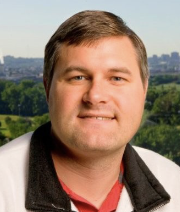 Dave Cummings, Tradebot
Dave Cummings, Tradebot
He keeps a low profile in Kansas City, but Dave Cummings has been an agent of change since he cracked our 40 Under Forty lineup in 2008. He’s been a busy fellow since then: After founding Tradebot Systems in 1999, which disrupted the equities-trading market with high-frequency, high-speed transactions, he turned his attention to a startup called BATS Global Markets, which took that concept to another level and surpassed the NASDAQ in daily trading volume before its $3.4 billion sale to the Chicago Board Options Exchange in 2017. Those successes have allowed him to become a major financial backer of a Kansas City logistics startup that has blown the doors off that sector nationally, NorthPoint Development. A published author, he wrote in his 2016 book “Make the Trade” that he was inspired to apply tech to trading after seeing IBM’s Deep Blue defeat world chess champion Garry Kasparov in a six-game match in 1997.
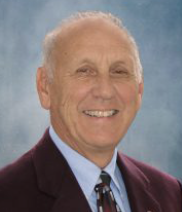 Dennis Curtin, RE/MAX Regional Services
Dennis Curtin, RE/MAX Regional Services
He never forgot his humble Northland upbringing, not even after turning the nation’s first RE/MAX franchise into a national—even international—power of home sales by forging a team with thousands of agents making the American Dream a reality for many. That’s a long way from the single Kansas City office he started with in 1975. He pays tribute to his own spartan upbringing as a passionate advocate for Mimi’s Pantry, which he launched to honor the memory of his mother and the way she used to feed patrons at her diner, even if they couldn’t afford to pay. Curtin sold his own franchise rights back in 1990, and turned his attention to building RE/MAX Mid-States and Dixie Region, which in 2021 reorganized under the RE/MAX Regional Services flag to better serve brokers and agents. He’s earned enough industry awards—both for professional achievement and philanthropic—to populate a personal trophy case.
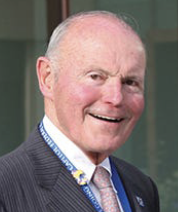 Jack Dicus, Capitol Federal Financial
Jack Dicus, Capitol Federal Financial
The Dicus name looms large in Kansas financial circles, particularly in Topeka, where John C. Dicus helped turn Capitol Federal Savings & Loan into a Sunflower State financial titan. After earning a business degree from the University of Kansas in 1955, he joined the bank in 1959 and served in various leadership roles until 2009, when he handed the reins off to his son, John B. Dicus, who continues with leadership duties today. When he first came on board, the institution was known as Capitol Federal Savings & Loan, primarily serving the mortgage market in the state. The senior Dicus oversaw a transition into the Capitol Federal Financial we know today, a publicly traded company with $9.59 billion in assets and nearly 50 locations across the state. He’s also a philanthropic champion; a $20 million gift from the Capitol Federal Foundation led to construction of Capitol Federal Hall at his alma mater.
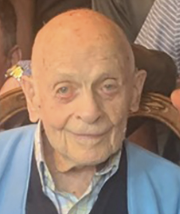 Bill Dunn, JE Dunn Construction
Bill Dunn, JE Dunn Construction
Bill Dunn was born a year before his father started a one-man construction company in 1924. Like the father, the son would become a legendary figure in Kansas City—as would the organization. After graduating from Rockhurst College, the younger Dunn went to work at the family enterprise, and was a fixture there for nearly 75 years before he finally relinquished his role as chairman emeritus in 2020. As CEO, he helped turn the company into one of the biggest contractors to call Kansas City home before turning that leadership over to his son, Terry, in 1989, serving as chairman for years afterward. Among his greatest civic contributions was the 1981 founding of the Dunn Family Foundation, with a commitment that became the gold standard for corporate philanthropy in the Kansas City region: donating 10 percent of its net income to charities every year. Last July, Bill’s family celebrated with him on his 100th birthday.
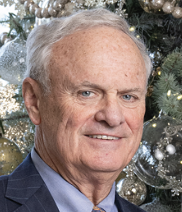 Terry Dunn, JE Dunn Construction
Terry Dunn, JE Dunn Construction
His grandfather hit the launch button on the company in 1924, and his father triggered the booster phase. But Terry Dunn, the third generation, put JE Dunn into orbit as CEO from 1989 through his retirement in 2013. He embraced growth and expansion strategies to create a national power in construction. By the time he left, he’d directed a revenue arc that went from about $150 million to more than $2.6 billion. More than that, he set in place a framework for growth by steering its transformation into employee ownership in 2010. Hard to argue with the results: the successive leadership, with Gordon Lansford as CEO and nephew Tim Dunn as chairman, pushed the firm to record revenues of $6.46 billion last year. Always a civic champion, he’s been laser-focused for the past decade with KC Common Good, a non-profit formed to promote economic opportunity and address the root causes of Kansas City’s crime problem.
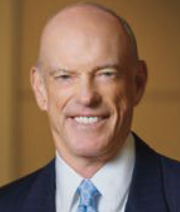 Bill Esrey, Sprint Corp.
Bill Esrey, Sprint Corp.
For a company that no longer exists—well, it does in another incarnation and brand—Sprint Corp. certainly made an impact on the Kansas City region. And one of those swinging the hammer was Bill Esrey, a Harvard MBA grad who had started his career with the Bell Telephone system. From there, he became president of Empire City Subway Co. in New York, then logged a decade at a Wall Street investment bank. In 1980, that East Coast history took a decidedly Midwestern turn when United Telecommunications came calling. It had yet to morph into Sprint by name, but with his reputation as an expert and forward thinker in energy and telecommunications, his services were in demand for a growing company. He came here in 1980 and became president and CEO five years later, holding that position for the next 18 years as Sprint became one of the nation’s three primary telecom service providers and one of this region’s biggest employers.
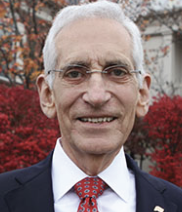 Jim Ferrell, Ferrellgas
Jim Ferrell, Ferrellgas
For someone who came back home in 1965 to provide short-term help with his father’s struggling propane business, Jim Ferrell re-defined what we might call stick-to-itiveness. “The last thing I wanted to do,” he would later recall, “was be a small, little propane retailer.” Turns out, he wasn’t. Not for long: After turning around the fiscal fortunes of the company, he became a big propane retailer, and Ferrellgas became the nation’s second-largest dealer. By the time he turned over the leadership to Tamria Zertuche last year, the company had nearly 1,000 locations and 4,500 employees nationwide. Ferrell’s penchant for acquisitions in a highly fragmented industry paved the way for its growth and later allowed him to launch Ferrell Capital, which manages the financial, business and personal affairs for the family, but also provides investment advisory services guidance on asset allocation and investment selection, fund management, and financial planning.
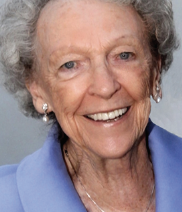 Anita Gorman, KC Parks Board
Anita Gorman, KC Parks Board
For more than 50 years, Anita Gorman was a fierce champion for the region’s quality of life. Passionate about the condition and amenities in the city’s parks, recreational venues, and conservation, she moved fluidly between leadership roles, fund-raising, and operating behind the scenes to influence policy with the executive and elected official classes. It all started on a personal level, fighting commercial overbuilding near her Northland home, an effort that led to creation of the park that today bears her name. That led her to the city’s Board of Park and Recreation Commissioners—the first woman to achieve that stature—serving as its president for nearly half her 12 years there. She also pres-sed for the passage of bond issues to improve the Kansas City Zoo, advocated for new parks, and called for improved maintenance of sculptures, fountains and monuments. Anita served as a commissioner for the Missouri Department of Conservation.
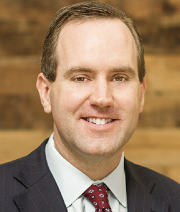 Nathaniel Hagedorn, NorthPoint Development
Nathaniel Hagedorn, NorthPoint Development
In terms of influential area business figures over the past 50 years, Nathaniel Hagedorn is something of a late-comer: He was barely 30 years old in 2012 when he assembled the pieces of what today is NorthPoint Development and set out to change the model for industrial property development in the U.S. It took him less than a decade to do that, and his Northland firm’s footprint has vastly outgrown the Kansas City market. With financial backing from deep-pocketed investors, NorthPoint has blossomed into a powerhouse with more than 150 million square feet of industrial property in its portfolio and nearly $20 billion in assets under management. Hagedorn himself has helped raise more than $16.5 billion to power its real estate investments and development projects, which also include more than 5,900 apartments.
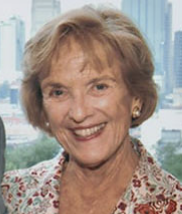 Adele Hall, Multiple Non-Profits
Adele Hall, Multiple Non-Profits
While her husband, Don Hall, was building Hallmark into the world’s first name in greeting cards, Adele Hall had her shoulder to a more philanthropic wheel. One needn’t look far to see evidence of the contributions she made before she died in 2013 at age 81. Start on the Hospital Hill campus of Children’s Mercy, where the region’s highest-level neonatal intensive care unit and the region’s only Level I pediatric trauma center bear her name. Children’s issues were favorites, but she served on the boards of national and regional organizations such as the American Red Cross, United Negro College Fund, Menninger Foundation, the George Bush Presidential Library Center and the Library of Congress Trust Fund. She was the first woman to lead the Heart of America United Way as chair, and sat on boards for the Greater Kansas City Community Foundation, Salvation Army and Starlight Theatre.
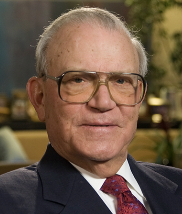 Donald Hall, Hallmark
Donald Hall, Hallmark
His father, Hallmark founder J.C. Hall, didn’t exactly gift-wrap the son’s career when Don Hall started there in 1953. He labored for five years before earning the vice-president title and nearly another decade before Dad retired. That set the stage for the younger Hall to lead the company for the next 20 years. On his watch, the company expanded into other lines with the acquisition of Crayola, multipurpose development with the Crown Center office, retail and residential complex, and media with the parent cable TV’s Hallmark Channel. Lesser-known among his contributions to the region is the role he played nearly 20 years ago to transfer one of the nation’s premier corporate collections of photography to the Nelson-Atkins Museum of Art. That 6,500-piece set bore an estimated value of $65 million, with much of the value gifted to the museum.
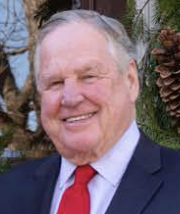 Mike Haverty, KC Southern/CPKC
Mike Haverty, KC Southern/CPKC
Starting at the bottom was a family tradition three generations before Mike Haverty came along nearly 80 years ago. His great-grandfather ably demonstrated that as an Irish immigrant on a track-laying crew before the start of the Civil War. Haverty’s grandfather was a Missouri Pacific brakeman; so was his father. And on his 19th birthday, young Mike Haverty followed suit, but he had a bigger role in mind: enrolling in the railroad’s management-training program, he earned a business degree (and later, an MBA), jumped to the Santa Fe Railway, and rose to president there. After joining Kansas City Southern, he led expansion with acquisitions that connected the regional carrier to ports in Mexico then Canada. He retired in 2013, but his work positioned the company for its eventual merger in 2021 with Canadian Pacific.
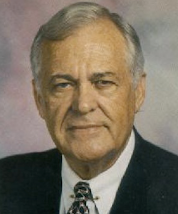 Paul Henson, United Telecommunications / Sprint
Paul Henson, United Telecommunications / Sprint
A number of hands were on the wheel as the Sprint Corp. rose from a small regional telephone company to the third-largest telecommunications company in the United States. But not everyone drove things forward quite as much as Paul Henson. He came on board at United Telecommunications when it had 500,000 customers, served 500 rural communities, and generated sales of $42 million. By the time he wrapped up his career there as chairman in 1990, Sprint had 4 million customers in 3,000 communities with sales of $8 billion, and was well on its way to becoming the Kansas City region’s biggest private-sector employer and No. 1 publicly traded company. Acquisitions accounted for much of that; Henson navigated 28 Sprint acquisitions during his tenure, during which the company built the nation’s only all-digital fiber-optic network, a visionary path that drove consumer growth. He was 71 when he died in April 1997.
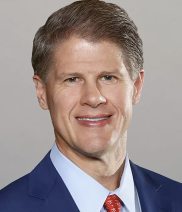 Clark Hunt, Kansas City Chiefs
Clark Hunt, Kansas City Chiefs
Clark Hunt is just one more Super Bowl championship ring away from attaining truly unique status in the century-plus existence of the National Football League: No other team or owner can claim to have won three straight league championships. As one of the heirs to the Lamar Hunt business legacy—and the one tasked with oversight of the Chiefs—Hunt currently presides over the most successful pro sports run this city has ever known. He’s a business version of the two-sport star; in addition to leading the Chiefs, he’s also owner and chairman of FC Dallas, which goes head-to-head against Sporting KC, the franchise his father founded. His workday doesn’t stop there; the family’s holdings also include warehousing and industrial-property developer Hunt Midwest, along with energy and natural resources interests and private equity investment.
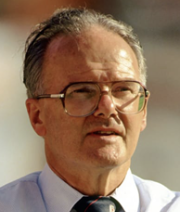 Lamar Hunt, Kansas City Chiefs
Lamar Hunt, Kansas City Chiefs
Lamar Hunt exhibited a typically Texan reaction to being told, “No, you can’t,” when the old National Football League denied his request to add an expansion team in Dallas. That region already had the Cowboys. The powers that be weren’t interested in cannibalizing market share. Hunt didn’t take his ball and go home, and he didn’t just form a team: He formed a whole new league, the AFL. After three seasons in Dallas, he sought a more receptive audience and found it in Kansas City. With some assistance from H. Roe Bartle—a man whose nickname was “The Chief’’—Hunt brought pro football to town in 1963. That, however, was just one measure of his impact here. His Hunt Enterprises also developed Worlds of Fun and Oceans of Fun, and the real estate arm of his holdings, Hunt Midwest, is a power player in industrial real estate development, warehousing and logistics. And don’t forget his vision that has made KC the Soccer Capital of the World with his ownership of The Kansas City Wizards.
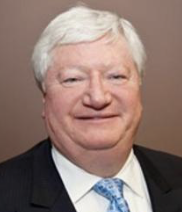 Cliff Illig, Cerner / Sporting KC
Cliff Illig, Cerner / Sporting KC
Cliff Illig will long be remembered as part of the founding triumvirate at Cerner Corp., which put Kansas City on the map for health-care IT and informatics. Over the past 20 years, though, he’s had his fingers in a lot of other pies. A big one was served up in 2006 when he teamed up with Cerner colleague Neal Patterson and three other business executives to buy the Kansas City Wizards from Lamar Hunt. Later rebranded Sporting KC, the team has elevated soccer’s presence in this region well beyond the goal lines of Children’s Mercy Park, building facilities and supporting youth programming that increased exposure to the sport and its popularity. That’s one major reason Kansas City was able to secure host-city status for the 2026 FIFA World Cup.
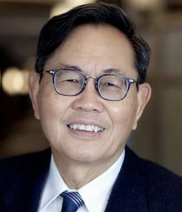 Min Kao, Garmin
Min Kao, Garmin
It’s a long way between a spartan office with two folding chairs and $5 billion in annual revenue with 35,000 employees world-wide. But Min Kao traversed every step of that, starting in 1989, when he and the late Gary Burrell founded Garmin (a mashup of their names). They drew on their background in electrical engineering and navigation systems to create personal GPS devices for consumers—cars, trucks, boats and planes. In doing so, they created a global tech power, one with a big impact on the regional economy here, with more than 5,000 people employed at the Olathe headquarters. If there’s a Taiwanese native who can belt out the University of Tennessee theme song “Rocky Top,” our money is on Kao: He donated $12.5 million to build a new engineering building at his alma mater—using that as an incentive to get state lawmakers to kick in $25 million—and $5 million more to fund scholarships and a professorship there.
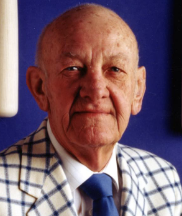 Ewing Kauffman, Marion Labs / Kansas City Royals
Ewing Kauffman, Marion Labs / Kansas City Royals
Visionary. Entrepreneur. Civic champion. Philanthropist. Mentor. You’ll turn a lot of pages in a dictionary looking up words to describe Ewing Kauffman. “Mr. K,” as his employees called him, amassed $5,000 to start a small pharmaceutical company—in his basement—selling calcium supplements made from crushed oyster shells. He translated that success into Marion Labs, sold controlling interest nearly 30 years later to Dow Chemical to create Marion Merrell Dow, and leveraged the proceeds to acquire the Kansas City Royals. And he spread the wealth: His profit-sharing model made millionaires of an estimated 300 Marion Labs employees upon the $2.2 billion sale. Before he died at age 76 in 1993, he structured the ball club ownership to keep the team here, essentially gifting it to the city by placing ownership under the control of the Greater Kansas City Community Foundation.
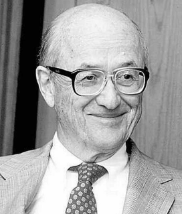 James Kemper Jr., Former Commerce Bank CEO
James Kemper Jr., Former Commerce Bank CEO
It really was a different era: Born into the third generation of an iconic Kansas City banking family—and enrolled at Yale when the Japanese bombed Pearl Harbor—James Kemper Jr. could have sought the refuge of privilege. Instead, he enlisted in the Army, served with a machine-gun unit in the south Pacific and earned a Purple Heart, then came home to resume his education and enter the family trade. He became president of Commerce Bank in 1955, throwing himself into civic responsibilities as well as business. He was the founding chairman of the Downtown Council, did a turn on the Kansas City school board, and was a trustee of the Midwest Research Institute, now MRIGlobal. On a national level, he was an associate of the Brookings Institute and chaired the Board of Associates of the Smithsonian, and also sat on the board of the Federal Reserve Bank of Kansas City. He died in December 2016 at the age of 95.
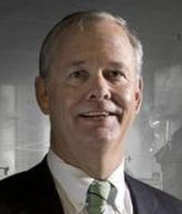 Jonathan Kemper, Commerce Bank
Jonathan Kemper, Commerce Bank
Like his father before him, Jonathan Kemper hitched his career wagon to Commerce Bank after first securing his Harvard MBA and working for three years in New York (for the Federal Reserve Bank) and Chicago (CitiCorp). He began the journey here in 1982 as a loan officer—no special status based on blood ties. Working his way up the organization, he became chairman and CEO in 1991, and held those duties through his retirement in 2018. Over that run, the bank’s growth produced better than an 11-fold increase in assets, from $2.14 billion to $24.45 billion. As chairman emeritus, he retains a seat on the bank’s board of directors, but that’s just one sliver of the board service he has accrued over the past 40 years, often to causes and organizations tied to his passion for history and historical preservation of architecture, including the Kansas City Public Library, as well as trustee positions with the family foundations.
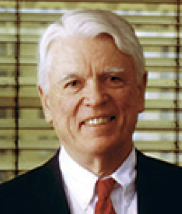 R. Crosby Kemper Jr., UMB Bank
R. Crosby Kemper Jr., UMB Bank
This towering figure of banking—figuratively and, at 6-foot-7, literally—contributed at least as much to the family’s banking legacy in Kansas City as did its 19th-century patriarch. After all, three children raised by R. Crosby Kemper Jr. went on to succeed him after his 30-year run leading UMB Bank and 54 years overall, from his hiring in 1950 to retirement as chairman in 2004. Banking was his passion, but just one of them—Kemper was fiercely devoted to the arts (the Kemper Museum of Contemporary Art was his baby), agriculture and entrepreneurship. He also donated the land for the West Bottoms arena that would bear his name, and his legendary philanthropy included a $2 million gift to restore the Liberty Memorial and World War I Museum. His civic engagement didn’t stop there; he ran as a Republican for the U.S. Senate in 1962. He died in 2014 at the age of 86.
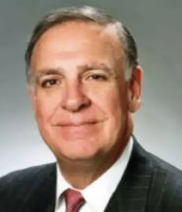 Jack Lockton, Lockton Companies
Jack Lockton, Lockton Companies
Kansas City’s remarkable roster of global enterprises that started with little more than a dream—men named Stowers, Hall, Bloch—wouldn’t be complete without Jack Lockton, who pulled it off on the most unlikely of stages: insurance. He founded the company that would bear his name in 1966, working out of an office set up in one bedroom of his home. After bringing aboard his brother, David, the fledgling firm gained momentum, and by the time Jack Lockton died of pancreatic cancer in 2004, his company was approaching the $1 billion revenue threshold, and he’d gone from a one-man operation to an army of associates 5,000-strong and the world’s largest privately held independent insurance brokerage. He was also a civic champion who served on the boards of UMKC, the Kansas City Chamber of Commerce, UMKC, and what is now MRIGlobal.
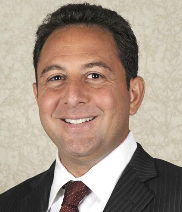 Peter Mallouk, Creative Planning
Peter Mallouk, Creative Planning
Recognized by the industry as an innovator who helped transform the wealth-management industry with a full-service business model and a full-blown commitment to adviser integrity, Peter Mallouk began his trek to the top of the Kansas City market after securing multiple degrees from KU, including the law degree and MBA he secured at the same time. After starting for a boutique investment advisory, he was able to purchase it in 2006, and the transformation was on. Today, Creative Planning is a national power—and getting more powerful all the time—not just in wealth management, but assisting clients with every aspect of business transactions adjacent to their holdings, from insurance to wills, to legal services, estate and tax planning, business services and more. Long focused almost exclusively on organic growth, he has shifted gears in recent years to drive his firm to No. 1 in this region, with assets under management/advisement of more than $300 billion.
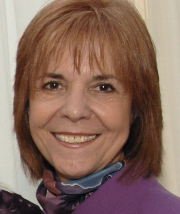 Carol Marinovich, Unified Govt.
Carol Marinovich, Unified Govt.
Carol Marinovich will be the first to tell you that she was just one soldier within a small army that secured voter approval to merge Wyandotte County and Kansas City, Kan., municipal governments back in 1998. None of the others, though, went on to become the first mayor/CEO of the Unified Government (she previously had been the first woman elected mayor of KCK itself). Before her second term concluded in 1995, her leadership had set the stage for additional growth that would follow in short order for a county long considered an economic backwater of the region. A year after she left office, the Village West retail and entertainment district opened, quickly becoming the state’s No. 1 tourist attraction. It created critical mass that drew in office development, hotels, big-box retail/grocery, and pro soccer’s Sporting KC stadium, all of which gave a much-needed boost to the county’s tax base.
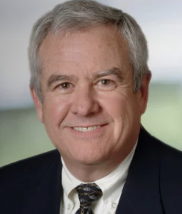 Tom McDonnell, DST Systems / Kauffman Foundation
Tom McDonnell, DST Systems / Kauffman Foundation
If there’s a poster boy for civic engagement from the C-suites in Kansas City, it might be Tom McDonnell. A native of Kansas City, he secured an MBA in finance from the prestigious Wharton School at the University of Pennsylvania, then signed on with DST Systems. At that time, it wasn’t far removed from startup as an information processing and computer software services company spun off from Kansas City Southern Railway. For nearly 40 years, he oversaw DST’s expansion domestically and its international growth, turning it into one of the region’s biggest public companies. He also demonstrated a fierce commitment to improving Kansas City, spearheading efforts to marshal support for the redevelopment of Quality Hill, home to DST’s headquarters. He followed that up with a stint as president and CEO of the Ewing Marion Kauffman Foundation.
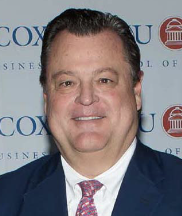 Michael Merriman, Financial Holdings Corp.
Michael Merriman, Financial Holdings Corp.
In 1979, Michael Merriman earned his business degree from Southern Methodist, then carved out a huge presence in Kansas City business. As chief executive officer of Financial Holding Corp., he built a private-sector business empire with vast holdings. His broad business background now covers real estate development, brokerage, management, and construction, along with design, sales, and leasing. Mainly through Americor Investment Group and FHC, his empire has spanned a diverse range of business interests. Among them are various insurance and financial-service entities, the Marriott Downtown Kansas City, a Washington-state winery, a gas exploration company, leasing and mortgage services and a cemetery. Recognized among its distinguished alumni, his alma mater has benefitted from his service on the executive board at the Cox School of Business.
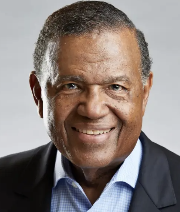 Leo Morton, UMKC / Aquila
Leo Morton, UMKC / Aquila
Business leadership. Higher-education administration. Non-profit philanthropic strategy and execution. Leo Morton brought it all to the Kansas City region over a career that still hasn’t seen its final chapter completed. The Alabama-born mechanical engineer from Tuskegee Institute earned a master’s in management from MIT before embarking on a business career that took him to General Motors (designing jet engines), Corning Glass, Bell Labs and AT&T. He fixed anchor here with Utilicorp United in 1994 and held various leadership positions there, including chief administrative officer after it became Aquila. From there, he stepped into higher ed as “interim” chancellor at UMKC in 2008—and stayed on for nine years as Chancellor. At that point, he completely failed retirement and signed on with the DeBruce Companies as president and COO.
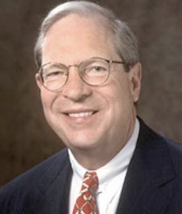 Bill Nelson, Boatmen’s Bank / Bank of America
Bill Nelson, Boatmen’s Bank / Bank of America
Bill Nelson came to town from RepublicBank Corp. in Dallas back in 1988, but it didn’t take him long to establish his place among the city’s business heavyweights. He served as CEO of Boatmen’s First National Bank of Kansas City—at that time, the largest in the market, by a considerable sum—through its $9.6 billion acquisition by NationsBank of Charlotte, N.C., which later rebranded as Bank of America. Nelson’s impact on business extended well beyond the bank lobby. He sat on the boards of directors of DST Systems, Blue Cross and Blue Shield of Kansas City, and what are now Evergy and MRIGlobal. His civic engagement included stints as chairman of the Civic Council of Greater Kansas City and the Kansas City Area Development Council and vice chairman of the Greater Kansas City Chamber of Commerce, among others.
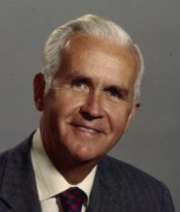 Miller Nichols, J.C. Nichols Real Estate
Miller Nichols, J.C. Nichols Real Estate
Do you appreciate the fountains, art and sculptures that define the Country Club Plaza? You can thank Miller Nichols for a lot of that. Same with free parking there—he considered it a defining attribute of that district. And the fact that it’s dotted not with filling stations but reclaimed properties serving as courtyards and businesses? That was his doing, as well. Of course, Nichols’ impact on Kansas City went well beyond the Plaza’s confines: He was a driving force behind the restoration of Mill Creek Park, he promoted the type of residential development that defines neighborhoods south of the Plaza, and into Johnson County, his advocacy for education kept him in board service for UMKC for 30 years and helped expand the campus footprint from 75 acres to 225. He also directed $3 million in personal and corporate gifts to UMKC (hence, the Miller Nichols Library designation).
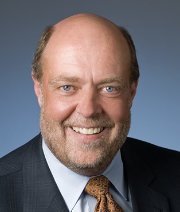 Bob Page, The University of Kansas Health System
Bob Page, The University of Kansas Health System
Kansas City is famous for its titans of business built from the ground up, but the chief architect of The University of Kansas Health System’s success had to create it from the wreckage of a nearly-failed enterprise. The hospital abutting Midtown had less than 30 days’ worth of operating cash on hand when it became a public health authority separated from state control. Since then, with a relentless focus on patient satisfaction, Page and his team have turned the mothership hospital into the biggest in this market based on admissions and revenues. On his watch, the health system has further embraced its statewide service mandate with multiple locations in Kansas, and most recently, he brought into the fold the Olathe Health System and forged an operating partnership with Liberty Hospital across the state line. Page is an Illinois native who came to Kansas City after working for what is now BJC HealthCare in St. Louis.
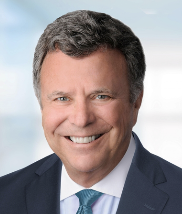 Neal Patterson, Cerner
Neal Patterson, Cerner
In the beginning, it was a three-man show, and it wasn’t Cerner—it was PGI Associates, using a monogram drawn from Neal Patterson, Paul Gorup and Cliff Illig’s surnames. (Thankfully, Illig’s took a back seat to avoid a branding challenge.) Five years after the health-care software firm debuted, it rebranded as Cerner Corp., and Patterson served as its CEO until his death at 67 in 2017. Along the way, it became a public corporation in 1986, then rocketed up the employer list in this region all the way to No. 1. At its zenith, Cerner had nearly 14,000 on the Kansas City-area payroll and about 25,000 worldwide. He learned about the balance of risk and reward growing up in the wheat belt of southern Kansas and northern Oklahoma, earned a finance degree and MBA at Oklahoma State, and he positioned himself for a career with Arthur Andersen, where he met Illig and Gorup before making history together.
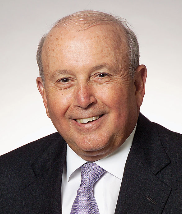 Jim Polsinelli, Polsinelli, PC
Jim Polsinelli, Polsinelli, PC
Talk about modest beginnings: Jim Polsinelli recruited a couple of lawyers to start a Kansas City law firm in 1973. That was just five years after he’d left UMKC’s School of Law, and by the time he retired in 2020, he had helped to create the second-biggest in the Kansas City market, with nearly 275 lawyers here and close to 1,000 nationwide. Polsinelli has an extensive service history with civic boards and advisory councils, but the causes nearest his heart involve education, particularly his family ties with Rockhurst High School. He was also on the Rockhurst University board for nine years, and for years sat on the UMKC Board of Trustees. His grandmother and father held masters’ degrees; he has one himself, and two of his children do, as well—a four-generation phenomenon. “Whatever success we’ve had as a family came from a strong belief, going back to my grandmother, in education,” he says.
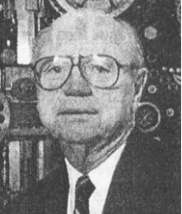 George Powell, Jr., Yellow Freight
George Powell, Jr., Yellow Freight
Back when he was washing dishes at a Northwestern University sorority—where he would meet his future wife—there wasn’t much to suggest that George Powell Jr. would rise to prominence among over-the-road trucking firms. Well, other than his dad’s employment as chief executive for the trucking firm they had purchased out of bankruptcy in 1952, that is. They moved the struggling Yellow Transit Freight Lines from Oklahoma City to Kansas City, quickly set it on the road to profitability, and began building one of the biggest brands in logistic transportation. After becoming chairman and CEO in 1968, he leveraged new opportunities in a deregulating industry to amass a work force of 28,000, with $2.3 billion in revenue, by the time he retired in 1991. He served on corporate boards for banks, manufacturers and energy companies, as well as various non-profits.
 Marjorie Powell Allen, Powell Gardens
Marjorie Powell Allen, Powell Gardens
Before she left us all too soon at the age of 63, back in 1992, Marjorie Powell Allen was a trailblazer in an era sociologists refer to as the second wave of the feminist movement. Born in the same decade that saw American women granted the right to vote, she grew up to be a force in education, philanthropy, business and, yes, marriage and motherhood. Her father, George Powell, had been president of Yellow Freight, and the family had sufficient means to donate the land that would, through her vision, energy and leadership, become Powell Gardens southeast of Kansas City. After earning bachelor’s and master’s degrees in physical education and recreation, she taught high school and college classes, raised two daughters, and became president of the Powell Family Foundation. She also founded the Women’s Employment Network and co-founded the Central Exchange.
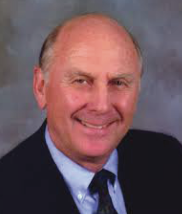 Jerry Reece, ReeceNichols
Jerry Reece, ReeceNichols
Connect the dots between a ruptured water-storage tank and a Kansas City real-estate empire: The line runs right to Jerry Reece, who moved here with his wife after their cattle ranch lost its water supply. A rancher instinctively knows the land; Reece would quickly embrace the sale of it—in large quantities. After starting his big-city career with the Kroh Brothers, he bought that brokerage’s residential real estate division in 1987, and J.D. Reece Realtors was born. It didn’t take long to assert its place in the hierarchy of residential realty firms. By 2002, he merged with the legendary J.C. Nichols Residential Real Estate to form Reece & Nichols, consistently among the top brands in regional home sales. After signing on as part of Warren Buffet’s Berkshire Hathaway empire, he became chairman emeritus. His extensive board history includes the UMKC trustees, trade associations, Commerce Bank, the American Cancer Society and many others.
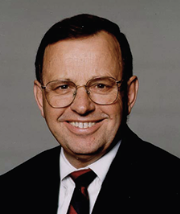 Dave Ruf, Burns & McDonnell
Dave Ruf, Burns & McDonnell
“On a farm,” Dave Ruf once told us, “you get all kinds of responsibilities at a young age. And if anything breaks, you’ve got to fix it.” Well, in 1985, things at Burns & McDonnell were as close to broken as they could be under the ownership of Armco Steel. The number of engineers there had plunged by half under 14 years of Armco management. Drawing on his farm-boy roots, Ruf fixed it, putting together a leadership team that ponied up a significant amount of capital—and personally risked going without paychecks if it didn’t take off under employee ownership. By 2002, when he hit the mandatory retirement age of 65, Burns & McDonnell had charged back to become the region’s second-largest design firm. It was then positioned for a series of all-star CEOs to step in and, most recently, have hit No. 1 on the region’s list of top engineering employers as a global powerhouse in design, engineering and construction.
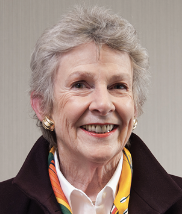 Betsey Solberg, Fleishman Hillard
Betsey Solberg, Fleishman Hillard
After 30 years of helping build Fleishman Hillard’s Kansas City office into the regional leader, Solberg retired but was called back before long after a series of leadership changes. But there was always more to her than the day job. For starters, she held leadership roles on behalf of the Greater Kansas City Chamber of Commerce and the Area Development Council, duties that reinforced what she’d learned about the quality of the executive workforce in Kansas City. “What you see in Kansas City is a level of CEO who cares a lot about the quality of life and a willingness to have not quite the ROI personally, in order to make sure there’s a finer quality of life for their employees, neighbors, stakeholders, even competitors,” she once told us. “I believe that is part of what sets Kansas City apart from all others.” She also has held board seats for Midwest Airlines, the UMKC Foundation and Ferrellgas.
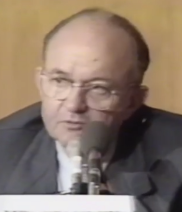 David Stanley, Payless Cashways
David Stanley, Payless Cashways
Before there were big-box home-improvement warehouses on the scale we know today, there was Payless Cashways in Kansas City. At one point, before Home Depot even existed and Lowe’s was a regional enterprise in the Carolinas, Payless Cashways was the third-largest enterprise of its kind. After taking the reins in April 1980, David Stanley positioned the company for new markets and bigger things, hoping to capture both the bigger-city weekend DIY crowd as well as the professional contractors and rural buyers who frequented its sprawling lumber yards. Revenues shot past $1.2 billion and the plan was working—until a hostile takeover prompted Stanley to take the company private in 1988. The debt from that proved unmanageable, and Payless Cashways descended toward bankruptcy. Stanley resigned in 1998, a year after it filed for Chapter 11 protection.
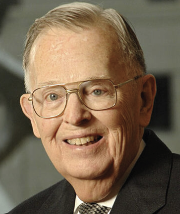 Jim Stowers, American Century / The Stowers Institute
Jim Stowers, American Century / The Stowers Institute
He was a World War II aviator who thought about following his grandfather and father as doctors. Instead, Jim Stowers opted to serve small investors, pooling $100,000 from two dozen shareholders to form Twentieth Century Investments in 1958. Nearly 40 years later, it was a regional and national power in wealth management, and with a new century approaching, it rebranded as American Century. But his impact would go much further before his death in 2014: As cancer survivors, he and his wife, Virginia, donated the vast majority of their $2 billion fortune to create the Stowers Institute for Medical Research. That helped put Kansas City squarely on the map for U.S. biomedical research, creating critical mass that has drawn additional life-sciences investment, research acumen and executive leadership to the region.
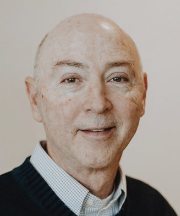 Charlie Sunderland, Ash Grove Cement
Charlie Sunderland, Ash Grove Cement
For the better part of a century, Ash Grove Cement was owned and operated by the Sunderland family, with fourth-generation member Charlie Sunderland the last in line before its 2017 sale to Irish construction giant CRH for a tidy $3.5 billion. Under Charlie’s leadership, Ash Grove had grown to become one of the Kansas City region’s biggest private companies. It had annual sales of more than $1.3 billion and more than 2,650 employees churning out Portland cement and other materials for the construction sector. The company, originally founded in the small town for which it is named (near Springfield, Mo.), was acquired by Charlie’s great-grandfather, Lester, who acquired it after coming on board in 1909. Charlie and brother Kent led the company from 2000 until its sale, which elevated the family foundation to one of the region’s largest. As its secretary/treasurer, he helps steer hundreds of millions of philanthropic dollars nationwide.
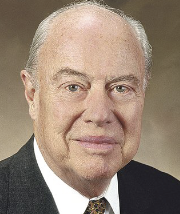 Hugh Zimmer, Zimmer Companies
Hugh Zimmer, Zimmer Companies
For nearly half a century, Hugh Zimmer helped bring business to life in Kansas City—not just his own, but those of owners for whom he developed the projects that would become their homes. During those 45 years, he’s credited with developing more than 2,900 acres of business parks and more than 30 million square feet of commercial buildings. His impact wasn’t limited to the Kansas City area; Zimmer also developed investment properties in Atlanta, Dallas, Louisville, Memphis, New Orleans, Oklahoma City and St. Louis. He was a Kansas City native who earned a finance degree at Mizzou, then focused on real estate studies at the University of Pennsylvania’s Wharton School. He was 88 when he died in 2019, four years after turning over the reins as chairman of Zimmer Cos., which included Zimmer Development Co., Zimmer Management Co., Newmark Grubb Zimmer and various project development and investment entities.